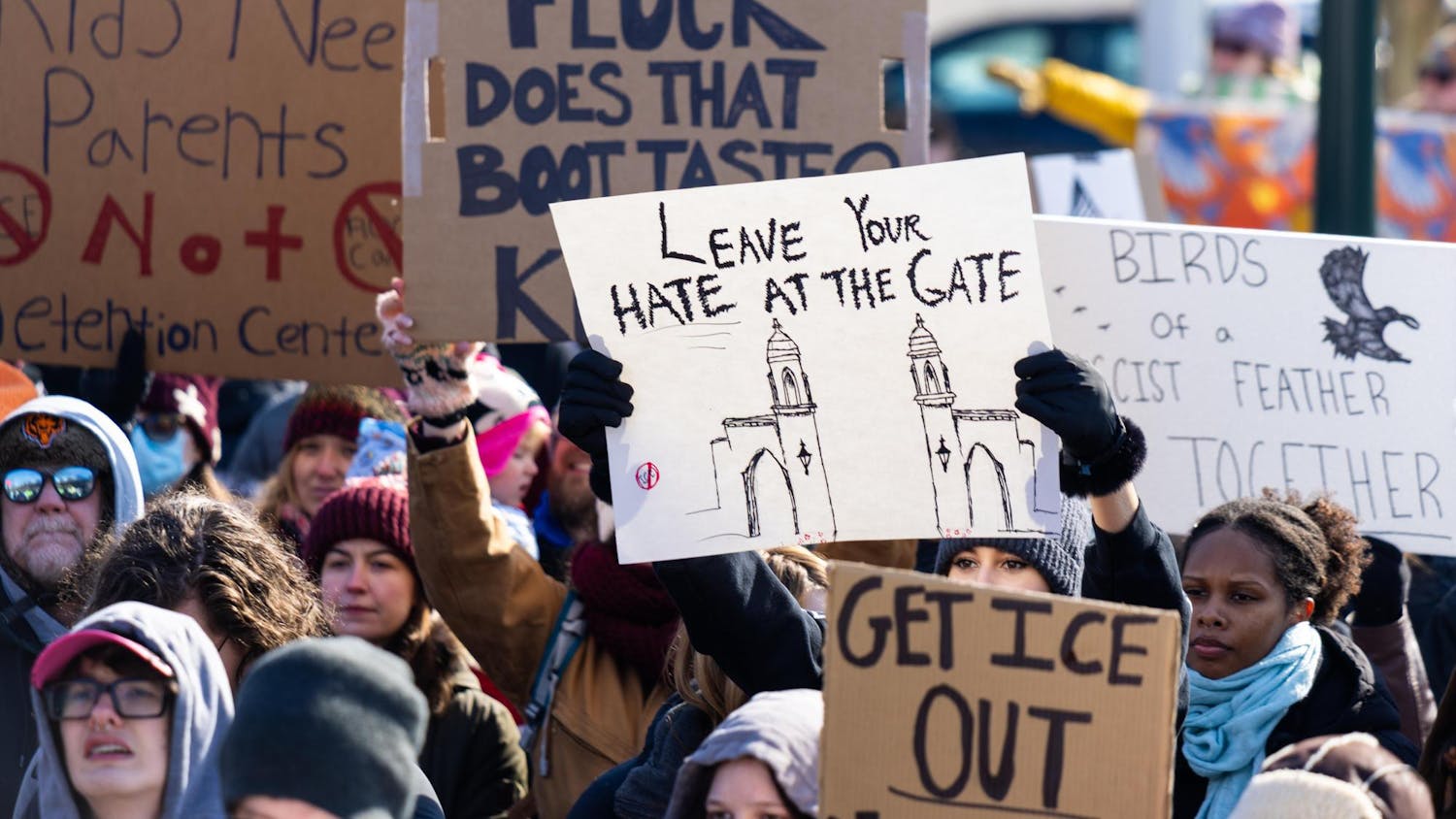Within the past year, Indiana Daily Student reporters and editors have faced significant issues with IU when trying to access publicly available information through the state of Indiana's public access law.
After a string of denied requests, a state opinion siding with the IDS over IU and an investigative editorial, the Foundation for Individual Rights and Expression reached out to IDS leadership to advocate for our press freedom and right to public information.
The IDS supplied materials and spoke about our difficulties to FIRE staff. This letter was culmination of those efforts:
Dear President Whitten:
The Foundation for Individual Rights and Expression, a nonpartisan nonprofit dedicated to defending freedom of speech and of the press, is concerned by Indiana University’s lack of transparency when responding to public records requests by student journalists. IU’s practice of belated and incomplete responses to requests posed by journalists at the Indiana Daily Student cripple the rights of the university’s independent student press. FIRE calls on IU to approach its relationship with IDS with transparency, not only in a way that follows the letter of the Indiana Access to Public Records Act, but that also reflects the university’s own commitments to transparency and truth.
I. Indiana University Delays Responses to Records Requests
During the 2021–22 academic year, Indiana Daily Student journalist Kaitlyn Radde investigated IU’s responsiveness to records requests, including by requesting a log of all requests the university completed. IU responded to that request with a log of requests submitted to the university, but did not include any information on the disposition of those requests. While a log including both what records had been requested and how the university responded to those requests exists, IU claimed it was not subject to release because a university attorney maintains it.
More questions than answers resulted from this investigation. So, Radde took to the pages of IDS to criticize IU’s purported commitment to transparency contrasted against its stonewalling approach to records requests.
In another example, IDS reporter Evan Gerike submitted a series of records requests on Feb. 23, 2022, only to have IU ask him to narrow the request a month later on March 25, 2022. But even with Gerike narrowing his request, it was not until after Radde’s editorial about IU’s lack of transparency appeared on May 3 that — within a day — the university finally responded, informing Gerike that three of his four requests had been denied under exceptions for privileged records, attorney work product, confidential records and/or inter-agency deliberative materials.
In another public records matter involving IDS, in November 2021, Indiana Public Access Counselor Luke Britt issued an opinion holding that IU violated the APRA when it inappropriately cited FERPA in declining a request by IDS reporter Cate Charron for a disciplinary record and Title IX case file.
Related: [IU’s denial of sexual assault record access violates public access laws, state says]
IDS editorial staff reports that it continues to face difficulties obtaining records from the university.
II. The APRA and IU’s Own Commitments Require IU to Deal with Student Journalists in a Transparent Manner
There is no question that IU is a public agency under Indiana’s public records statute, nor does IU dispute this. Instead, IU appears intent on, at best, minimally complying with the law, and at worst, outright violating it. Yet, even as IU flirts with minimal compliance, it certainly does not live up to its motto of “Lux et Veritas” (Light and Truth). In IU’s own words, this motto is meant to “evoke[] the light of inquiry—an exploration of truth and a turning away from ignorance” — in other words, transparency. And yet, IU’s track record on public records requests, perhaps especially those originating with student journalists, instead reflects a culture of shadows and silence.
A. IU’s Responses to IDS’s Records Requests Demonstrate a History of Violating the APRA
In at least two recent cases, IU violated the APRA in its dealings with IDS. In the first example, in which the Public Access Counselor already found a violation, IU denied a request by IDS journalist Cate Charron. When Charron requested a student’s disciplinary record and a Title IX case file, IU claimed disclosure of such records is prohibited under FERPA. Despite FERPA making clear that it does not “prohibit an institution . . . from disclosing the final results of any disciplinary proceeding . . . against a student who is an alleged perpetrator of any crime of violence . . . or a nonforcible sex offense,” IU refused to determine if any records responsive to Charron’s request constituted final results of such disciplinary proceedings and instead outright denied the request.
Related: [Dissonance in due process]
In a second recent violation of the APRA, IU’s delayed response to Gerike’s request did not reflect provision of records “[w]ithin a reasonable time.” While the APRA does not define “reasonable time,” the Public Access Counselor has explained that “what is a reasonable time . . . depends on the public records requested and the circumstances surrounding the request.” In a recent opinion, the Public Access Counselor held an Indiana town violated the APRA by “waiting months before releasing the first document,” which was “not reasonable by any objective standard.” This was true despite the fact that the underlying request was complex and may have included voluminous responsive documents.
Related: [The program is doomed’: Players say Indiana volleyball coach Steve Aird created a culture of fear
It took IU took an entire 30 days just to determine that Gerike’s requests were not “reasonably particular” under APRA, and as such required narrowing. It strains credulity to conceive of a reasonable justification for taking an entire month to read a series of requests and determine they lack specificity. Following that substantial delay, Gerike narrowed his requests, but IU waited another two months before notifying him it had no responsive records to one of those requests. It similarly is outlandish that the university would need two months to search emails between two individuals to determine no such emails existed.
Even as to Gerike’s remaining three requests, which IU declined on the asserted ground that all responsive records were either privileged, attorney work product or inter-agency material, it is unlikely the university reasonably needed two months to make this determination. The timeline of responsiveness becomes more dubious when one realizes IU responded only after its APRA practices came into question due to Radde’s editorial on May 3.
IU must revise its public records practices to comply with the APRA by responding within a reasonable time and by more readily disclosing documents rather than taking months to determine if it can twist any APRA exemptions into assertedly justifying nondisclosure.
B. IU’s Handling of IDS’s Records Requests Violates the Spirit of the APRA and Its Own Commitments to Transparency
Precedent mandates interpreting APRA with “a presumption in favor of disclosure” consistent with its purpose to “promot[e] government transparency.” This goal mirrors IU’s own “Lux et Veritas” motto, which the university posits is a reflection of its value in an honest search for truth. IU also considers among its “highest standards of ethical conduct and integrity” the value of “[d]iscovery and the search for truth.”
Related: [After violating state public access law, IU continues to deny IDS sexual assault records]
While the APRA may not always require absolute transparency, IU is ethically obliged to stand by its own values and policies. Unfortunately, student journalists seeking to uphold these values by investigating and publishing the truth face obstacles established by a university apparently intent to work in the shadows, despite claiming that its “Principles of Ethical Conduct” seek to promote the goal of “transparency.”
III. IU Must Commit to Transparency in Future Dealings with Student Journalists
IU’s record on transparency is dubious at best, and nowhere is that clearer than in an inspection of its relationship with student journalists from the Indiana Daily Student. In order to both comply with state law and demonstrate that its commitments to truth and transparency are not empty words, IU must improve its process for responding to public records requests.
We request a substantive response to this letter no later than the close of business on Thursday, Dec. 15, 2022, confirming that IU will make necessary revisions to its public records policies in order to comply with the APRA and its own promises of transparency.
Sincerely,
Lindsie Rank
Student Press Counsel




